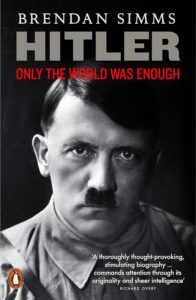 Significantly, the first mission of his new paramilitary formation, undertaken even before it was christened the SA, was an attack not on the Jews, communists or Social Democrats, but on a meeting of [particularist —Ed.] Ballerstedt’s Bayernbund in the Löwenbräukeller in the summer of 1921 under the banner ‘we will not betray Bavaria’. Hitler led an assault in which Ballerstedt was manhandled and the police were eventually called to break up the fight. His violent behaviour earned him a short jail sentence. By contrast, it is not documented that Hitler ever personally laid hands on an individual Jew, either then or subsequently. Hitler’s campaign against Bavarian federalism in general and his vendetta against Ballerstedt in particular continued throughout the 1920s and remained a preoccupation until he had him killed during the ‘Night of the Long Knives’.
Significantly, the first mission of his new paramilitary formation, undertaken even before it was christened the SA, was an attack not on the Jews, communists or Social Democrats, but on a meeting of [particularist —Ed.] Ballerstedt’s Bayernbund in the Löwenbräukeller in the summer of 1921 under the banner ‘we will not betray Bavaria’. Hitler led an assault in which Ballerstedt was manhandled and the police were eventually called to break up the fight. His violent behaviour earned him a short jail sentence. By contrast, it is not documented that Hitler ever personally laid hands on an individual Jew, either then or subsequently. Hitler’s campaign against Bavarian federalism in general and his vendetta against Ballerstedt in particular continued throughout the 1920s and remained a preoccupation until he had him killed during the ‘Night of the Long Knives’.
Hitler’s view of foreign policy was, as we have seen, strongly ideological. That said, he was also beginning to develop a keen sense of geopolitics. In part, this followed the prevailing discourse of Germany’s central location in Europe and her consequent vulnerability to ‘encirclement’. He spoke of ‘the position of our fatherland, which was geographically one of the most unfortunate in Europe’. Hitler inveighed repeatedly against the ‘encirclement attempts of the Entente against Germany’. Where Hitler went much further than the nationalist mainstream was over the growing question of space, the Raumfrage, references to which increased exponentially during the early 1920s. In mid April 1920, Hitler lamented that ‘the world was so unjustly distributed’. Four months later, he noted that Germany suffered from a crippling lack of space by comparison with Britain, which controlled about one-quarter of the entire globe. By March 1921, Hitler decried the injustice that Britain, with a smaller population, controlled ‘three-quarters of the entire world’, while more populous Germany had to make do with considerably less space. This sense of connection between Germany’s ‘disadvantageous military location’ and the ‘impossibility of securing the food supply in Europe’ stayed with Hitler to the end.
The cause of this unequal distribution, he believed, was global capitalism and its associated system of world governance. ‘The international exploitation of capitalism must be combated’, Hitler demanded, as well as that of ‘international loan capital’. ‘We want to turn world slaves into world citizens,’ he announced. This required ‘the liberation of our German people from the fetters of its international world enslavement’. This in turn meant that Germany would have to regain its military freedom of action. ‘The German is either a free soldier,’ Hitler argued, ‘or a white slave.’ He therefore called upon the German people to relearn the old adage that ‘whoever does not want to be a hammer must be an anvil’, adding that ‘we are an anvil today, and were being beaten until the anvil became a hammer’, that is a ‘German sword’. The idea that Germany must become a ‘hammer’ to avoid remaining an ‘anvil’ was a common trope at the time and one to which Hitler returned on a number of occasions.
In short, Hitler saw the root of Germany’s evils in her external subjection… Any prospect of a vigorous German foreign policy, Hitler claimed, ‘is predicated on a radical domestic political change’. In this context, the defeat of 1918 could be put to good use. Just as the catastrophe of 1806 had led to the Wars of Liberation in 1813, Hitler hoped that defeat in 1918 and the humiliation of Versailles would be followed by a national revival; ‘fall’, ‘purification’ and ‘rebirth’ were common tropes in Weimar Germany. Hitler’s rhetoric consciously mimicked that of the great patriotic martyr Palm, a Nuremberg bookseller who was executed by Napoleon in Hitler’s hometown of Braunau for penning the rousing tract ‘Germany in its deepest humiliation’…